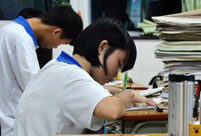Students prepare for the gaokao, China’s national university entrance exam, at No 2 Middle School in Nanchang, the capital of Jiangxi province. (Photo/Xinhua)
High school's intense training program yields many high-score students, but stifles creativity, report Hou Liqiang and Zhang Yu in Hengshui, Hebei province
It's make-or-break time for millions of high school students in China.
Saturday morning signals the start of two days of grueling activity, both mental and physical, as students take the national university entrance exam known as gaokao. Because success in the exam can open the door to a well-paid job and high social standing, the pressure on the students can be overwhelming.
However, few students are as committed, or prepared for gaokao success, as those at Hengshui High School in Hebei province, which has gained fame - and some criticism - for its tough regime and impressive success rate.
For senior students, the day begins at 5:30 am and lasts until 10:10 pm, with every hour punctuated by the incessant ringing of bells that announce classes, break times, self-study periods, extracurricular activities and dormitory time.
The students spend most of their time in cramped classrooms. Although the designated food breaks last 40 minutes, many students rush to the canteen and wolf down their food in less than five minutes so they can snatch an extra few minutes for their studies.
Sun Yajian, a freshman at Shanghai International Studies University, who graduated from Hengshui High last year, said he even ran to the canteen to save time. "I usually spent three to five minutes eating dinner. Once, I even finished my meal in less than two minutes," the 20-year-old said. "I only ate to fill my stomach. I didn't care what I ate, just as long as I was full."
The regime is tough. In addition to teachers and members of the students union who patrol the school to ensure discipline, cameras constantly scan the classrooms searching for students neglecting their work. Cell phones are not allowed, and if you don't consider the 20 minutes allocated daily for watching news broadcasts, or the weekly class meetings, which occasionally feature an inspirational video, as entertainment, then there's no entertainment, either.
The students are usually given one day off every four weeks, after taking a monthly test, but they are also tested every day and once a week. The results are posted publicly to show the changes in each student's ranking.
The school is also famed for its tight management of extracurricular activity. Ren Yueming, a freshman at China University of Political Science and Law in Beijing, graduated from Hengshui High last year. She said students are not even allowed to see their parents privately at the school gates, and with the exception of formal holidays, they have to present the doorkeeper with a permit from their teacher if they want to leave the campus.
In class, any activity unrelated to study can be considered a breach of discipline, including shuffling papers and chatting, said Sun. "Students have to follow the teachers in class. You can't do things based on your own plans," he said.
The demanding system seems to pay dividends, though: In 2013, the school sent 104 graduates to Tsinghua University and Peking University, China's most-prestigious universities. The figure accounted for 80 percent of the two universities' total enrollment from Hebei, and 20% of the university candidates from Hebei who scored more than 600 points in the gaokao were graduates of Hengshui High.
Last year was no flash in the pan, either. The school has been ranked Hebei's number one for university enrollment for 14 consecutive years.
However, while no one doubts the school's success, critics argue that the routine stifles creativity and independent thought, and some have even labeled it an "academic factory", focused purely on gaokao success to the exclusion of other aspects of the students' personalities.
"If I were offered the chance to choose again, I wouldn't spend the three years at such a school, and I would never let my children attend such an institution," said Li Jingnan, a graduate student majoring in accountancy at Tianjin University of Finance & Economics.
Li said the academic day was even longer when he studied at Hengshui High 10 years ago. The 28-year-old said he was unhappy with the mode of teaching employed, claiming that it "tightly controls students", making them mentally "rigid", something that left him unprepared for life in the outside world. "I found myself at a loss when I entered university, not knowing what I wanted or what to do. I had lost my sense of direction after three years at the school where everything was rigorously controlled," he said.
 |
 Magnificent Hutiao Gorge
Magnificent Hutiao Gorge  Heat waves hit China
Heat waves hit China Love at the construction site
Love at the construction site Graduation photos bring memories back to life
Graduation photos bring memories back to life Art school students present works in Nanjing
Art school students present works in Nanjing Xinjiang's first high-speed railway goes on trial run
Xinjiang's first high-speed railway goes on trial run 3D Sea-life Themed Art Garage unveiled in Zhengzhou
3D Sea-life Themed Art Garage unveiled in Zhengzhou
 Creative Photos go viral during graduation season
Creative Photos go viral during graduation season Students in last-minute effort for Gaokao
Students in last-minute effort for Gaokao Dali, an ideal summer vacation destination
Dali, an ideal summer vacation destination Xichan Temple's little monk hit the Internet
Xichan Temple's little monk hit the Internet Monologue of a modern dancer
Monologue of a modern dancer College girl proposes to boyfriend on Weibo
College girl proposes to boyfriend on Weibo Special operation members in counter-terrorism training
Special operation members in counter-terrorism training American football brings manhood out of boys
American football brings manhood out of boysDay|Week|Month